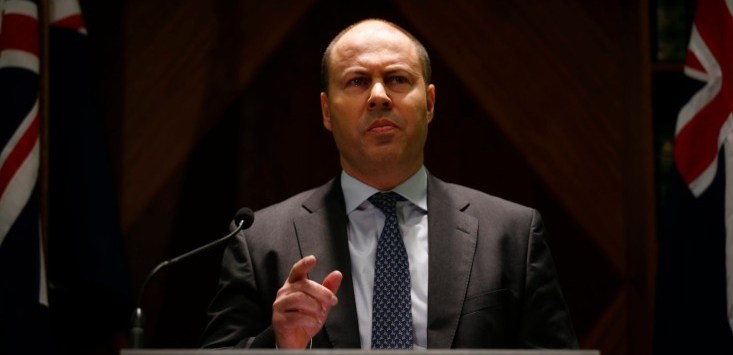
Treasurer Josh Frydenberg. Source: AAP/Daniel Pockett.
It’s official: Australia has fallen into its first recession in almost 30 years, as a 7% decline in gross domestic product (GDP) in the June quarter compounds an 0.3% contraction last quarter, according to the Australian Bureau of Statistics (ABS).
The figures, which outline historic contractions across most major parts of the Australian economy, reveal the recession has been led by a collapse in household demand amid coronvirus restrictions on movement, worsening labour market conditions and a higher propensity to save.
Treasurer Josh Frydenberg, speaking to the media in the wake of the figures on Wednesday, said there’s likely to be further bad news in the September quarter, with the impact of Victoria’s second lockdown not captured in the new figures.
“Today’s devastating numbers confirm what every Australian knows – COVID-19 has wreaked havoc on our economy and our laws. It is nothing we have ever experienced before,” he said.
But the Treasurer stood firm when asked whether JobKeeper payments should be kept at $1500 because of the downturn, saying it would still be necessary to taper off the support heading into October.
Instead, Frydenberg again raised the prospect of supply-side reforms in the October budget, such as cutting red tape for businesses and lowering taxes.
“How do we make it easier for businesses to do business? That is where, without great cost to the budget, you can unlock the entrepreneurship and innovation of our businesses, and that is about cutting red tape,” Frydenberg said.
The no-good, terrible, very bad quarter
While the economic impact of the COVID-19 pandemic has been known for some time, Wednesday’s figures reveal how the crisis has disrupted the economy through each industry and household.
Notable data points for small businesses include a sharp fall in discretionary spending, down 27.8% year-on-year and 25% on the quarter, as households went into savings mode, constrained by public health restrictions.
Household consumption itself fell 12.1% in the June quarter and 2.6% over the 2019-20 financial year — the first annual fall ever recorded in Australia.
The decline was driven by a 17.6% fall in household spending, particularly on services such as transport, accommodation and catering. Discretionary spending plummeted 27.8% year-on-year.
While household incomes rose 2.2% in the quarter, this was driven by increases in non-labour associated income as government support measures increased social assistance to households and earnings for unincorporated businesses, which rose 21.9% in the quarter.
These government support programs saw public final demand (excluding JobKeeper) increase 6.3% over the quarter, partially offsetting large falls in private sector and household spending. Subsidies on production reached $52 billion in the June quarter, 60% of which were JobKeeper payments.
Even in a recession, company profits rise
The explosion in government support for businesses supported profit growth through the June quarter, with corporate gross operating surplus increasing 11.1% against the March quarter and 12.7% year-on-year.
Meanwhile, total labour compensation fell 2.5% against the March quarter, increasing 0.4% year-on-year, as the share of income attributed to labour fell below 50% for the first time in more than 60 years.
This means a higher proportion of income derived from production flowed into capital rather than labour for the first time since 1959, a longstanding trend that appears to have been exacerbated by Australia’s response to the coronavirus crisis.
This shift coincided with an unprecedented fall in household demand as wages supported by JobKeeper were more than offset by a significant decline in hours worked, enough to support a 3.1% increase in average compensation per employee as casual and part-time jobs declined as a proportion of total employment.
NOW READ: Peter Strong: Australia’s economic recovery depends on us all listening to each other


COMMENTS
SmartCompany is committed to hosting lively discussions. Help us keep the conversation useful, interesting and welcoming. We aim to publish comments quickly in the interest of promoting robust conversation, but we’re a small team and we deploy filters to protect against legal risk. Occasionally your comment may be held up while it is being reviewed, but we’re working as fast as we can to keep the conversation rolling.
The SmartCompany comment section is members-only content. Please subscribe to leave a comment.
The SmartCompany comment section is members-only content. Please login to leave a comment.